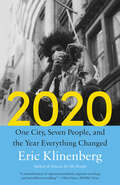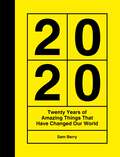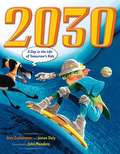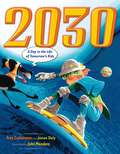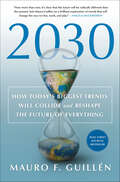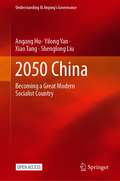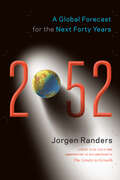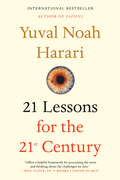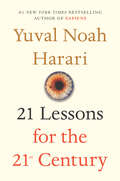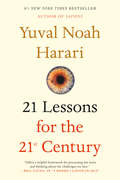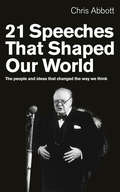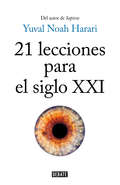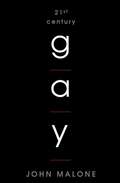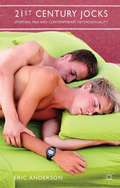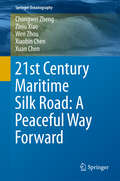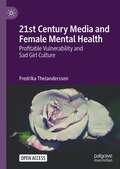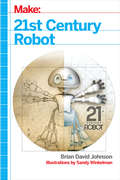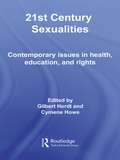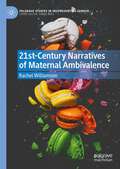- Table View
- List View
2020: One City, Seven People, and the Year Everything Changed
by Eric KlinenbergA meticulously reported, character-driven, unforgettable investigation of a time when nothing was certain and everything was at stake, by the acclaimed sociologist and best-selling author Eric Klinenberg&“A gripping, deeply moving account of a signal year in modern history, told through the stories of seven ordinary people. Klinenberg&’s narrative shows how the legacy of that year continues to shape us, our politics and our personal lives.&”—Siddhartha Mukherjee, Pulitzer Prize-winning author of The Emperor of All Maladies • "I can easily see this book being invaluable in the future."—Stuart Miller, Los Angeles Times2020 will go down alongside 1914, 1929, and 1968 as one of the most consequential years in history. This riveting and affecting book is the first attempt to capture the full human experience of that fateful time.At the heart of 2020 are seven vivid profiles of ordinary New Yorkers—including an elementary school principal, a bar manager, a subway custodian, and a local political aide—whose experiences illuminate how Americans, and people across the globe, reckoned with 2020. Through these poignant stories, we revisit our own moments of hope and fear, the profound tragedies and losses in our communities, the mutual aid networks that brought us together, and the social movements that hinted at the possibilities of a better world.Eric Klinenberg vividly captures these stories, casting them against the backdrop of a high-stakes presidential election, a surge of misinformation, rising distrust, and raging protests. We move from the epicenter in New York City to Washington and London, where political leaders made the crisis so much more lethal than it had to be. We bear witness to epidemiological battles in Wuhan and Beijing, along with the initiatives of scientists, citizens, and policy makers in Australia, Japan, and Taiwan, who worked together to save lives.Klinenberg allows us to see 2020—and, ultimately, ourselves—with unprecedented clarity and empathy. His book not only helps us reckon with what we lived through, but also with the challenges we face before the next crisis arrives."A masterful piece of rigorous journalism, rigorous sociology, and incredible story-telling."—Chris Hayes, MSNBC News
2020: Twenty Years of Amazing Things That Have Changed Our World
by Sam BerryCan you recall the year that the Dracula fish was discovered?Do you know the height and location of the world’s tallest building?Remember the company that discovered a way to convert water and CO2 into fuel?This unique trivia compendium presents an illustrated snapshot of the world twenty years after the new millennium.Taking stock of the most impressive achievements, terrific disasters and marvellous innovations that have changed our world, 2020 brings together top twenties of fascinating facts and figures on subjects ranging from life-saving technological advancements to freak weather phenomena, outstanding sporting achievements to unexpected political shake-ups. Whatever your interests, you’ll be amazed, amused, surprised and enlightened by this testament to the catastrophic lows and unbelievable highs of human endeavour.
2023 Asia-Singapore Conference on Sport Science: Practical Challenges Encountered in Sport and Solutions Adopted in Sport Science (Springer Proceedings in Behavioral & Health Sciences)
by Joe Walsh Mike Climstein Ian Tim HeazlewoodThis book contains the conference proceedings from the 2023 Asia-Singapore Conference on Sports Science (ACSS). ACSS is an international conference that assists researchers in the Asia-Pacific region in disseminating and communicating their research findings on the latest topics in sports science. This book provides students and scholars with a compilation of the latest research in the field of Sport Science presented at the conference. The book covers a wide range of Sport Science topics, including physical and biological sciences, social science and education.
2030: A Day In The Life Of Tomorrow's Kids
by James Daly Amy ZuckermanGlobal events and new technology change how we live from moment to moment. So, what will our world be like in twenty years? Come take a look as futurists Amy Zuckerman and James Daly examine what a kid?s daily life might be like in the year 2030. Inspired and informed by trends and scientifi c and technological research, 2030 is not only a peek at some cool future gadgets (talking dog collars, cars that drive themselves), but also a thoughtful examination of how our lives might be impacted as we adjust to environmental change.
2030: A Day in the Life of Tomorrow's Kids
by James Daly Amy ZuckermanWinner of the 2012 Grand Canyon Reader Award for a Non-fiction bookGlobal events and new technology change how we live from moment to moment. So, what will our world be like in twenty years? Come take a look as futurists Amy Zuckerman and James Daly examine what a kid?s daily life might be like in the year 2030. Inspired and informed by trends and scientifi c and technological research, 2030 is not only a peek at some cool future gadgets (talking dog collars, cars that drive themselves), but also a thoughtful examination of how our lives might be impacted as we adjust to environmental change.
2030: How Today's Biggest Trends Will Collide and Reshape the Future of Everything
by Mauro F. GuillénAN INTERNATIONAL BESTSELLERWall Street Journal BestsellerA Porchlight Book BestsellerFinancial Times Best Books of 2020Yahoo Finance Favorite Business Books of 2020 JP Morgan NextList 2021 selection"Bold, provocative...illuminates why we’re having fewer babies, the middle class is stagnating, unemployment is shifting, and new powers are rising.”—ADAM GRANTThe world is changing drastically before our eyes—will you be prepared for what comes next? A groundbreaking analysis from one of the world's foremost experts on global trends, including analysis on how COVID-19 will amplify and accelerate each of these changes.Once upon a time, the world was neatly divided into prosperous and backward economies. Babies were plentiful, workers outnumbered retirees, and people aspiring towards the middle class yearned to own homes and cars. Companies didn't need to see any further than Europe and the United States to do well. Printed money was legal tender for all debts, public and private. We grew up learning how to "play the game," and we expected the rules to remain the same as we took our first job, started a family, saw our children grow up, and went into retirement with our finances secure.That world—and those rules—are over.By 2030, a new reality will take hold, and before you know it:- There will be more grandparents than grandchildren- The middle-class in Asia and Sub-Saharan Africa will outnumber the US and Europe combined- The global economy will be driven by the non-Western consumer for the first time in modern history- There will be more global wealth owned by women than men- There will be more robots than workers- There will be more computers than human brains- There will be more currencies than countriesAll these trends, currently underway, will converge in the year 2030 and change everything you know about culture, the economy, and the world.According to Mauro F. Guillen, the only way to truly understand the global transformations underway—and their impacts—is to think laterally. That is, using “peripheral vision,” or approaching problems creatively and from unorthodox points of view. Rather than focusing on a single trend—climate-change or the rise of illiberal regimes, for example—Guillen encourages us to consider the dynamic inter-play between a range of forces that will converge on a single tipping point—2030—that will be, for better or worse, the point of no return.2030 is both a remarkable guide to the coming changes and an exercise in the power of “lateral thinking,” thereby revolutionizing the way you think about cataclysmic change and its consequences.
2050 China: Becoming a Great Modern Socialist Country (Understanding Xi Jinping’s Governance)
by Angang Hu Yilong Yan Xiao Tang Shenglong LiuThis book is open access under a CC BY-NC-ND 4.0 license.This book is arranged and developed around the theme of “2050 China,” it analyzes the factors and advantages of the Chinese road to socialist modernization, explores and summarizes the development goal and the basic logic of the socialist modernization of China, and further shows the general basis of the primary stage of socialism. According to the report delivered at the 19th Party Congress, and according to the “two-stage” strategic plan, this book looks ahead in detail to the overarching objective and sub-objectives of essentially achieving socialist modernization by 2035, discusses the building of a great modern socialist country in all respects from the perspective of the Party’s six-sphere integrated plan of economic, political, cultural, social, ecological civilization, and national defense construction, and provides policy proposals. This book also analyzes the influence and the effect of the socialist modernization with Chinese characteristics on the world and it further presents the third centenary goal. In conclusion, this book is an elaboration of the work of the Institute for Contemporary China Studies, Tsinghua University. It reflects the intellectual innovation in the authors’ research on contemporary China, as well as the authors’ foresight and predictions about China’s future development.
2052: A Global Forecast for the Next Forty Years
by Jorgen RandersWith clarity, conscience, and courage, global-systems pioneer Jorgen Randers and his distinguished contributors map the forces that will shape the next four decades.Forty years ago, The Limits to Growth study addressed the grand question of how humans would adapt to the physical limitations of planet Earth. It predicted that during the first half of the 21st century the ongoing growth in the human ecological footprint would stop-either through catastrophic "overshoot and collapse"-or through well-managed "peak and decline."So, where are we now? And what does our future look like? In the book 2052, Jorgen Randers, one of the coauthors of Limits to Growth, issues a progress report and makes a forecast for the next forty years. To do this, he asked dozens of experts to weigh in with their best predictions on how our economies, energy supplies, natural resources, climate, food, fisheries, militaries, political divisions, cities, psyches, and more will take shape in the coming decades. He then synthesized those scenarios into a global forecast of life as we will most likely know it in the years ahead.The good news: we will see impressive advances in resource efficiency, and an increasing focus on human well-being rather than on per capita income growth. But this change might not come as we expect. Future growth in population and GDP, for instance, will be constrained in surprising ways-by rapid fertility decline as result of increased urbanization, productivity decline as a result of social unrest, and continuing poverty among the poorest 2 billion world citizens. Runaway global warming, too, is likely.So, how do we prepare for the years ahead? With heart, fact, and wisdom, Randers guides us along a realistic path into the future and discusses what readers can do to ensure a better life for themselves and their children during the increasing turmoil of the next forty years.
21 Lessons for the 21st Century
by Yuval Noah HarariWith Sapiens and Homo Deus, Yuval Noah Harari first explored the past, then the future of humankind, garnering the praise of no less than Barack Obama, Bill Gates, and Mark Zuckerberg, to name a few, and selling millions of copies in the over 30 countries it was published. In 21 Lessons for the 21st Century, he devotes himself to the present.21 Lessons For the 21st Century provides a kind of instruction manual for the present day to help readers find their way around the 21st century, to understand it, and to focus on the really important questions of life. Once again, Harari presents this in the distinctive, informal, and entertaining style that already characterized his previous books. The topics Harari examines in this way include major challenges such as international terrorism, fake news, and migration, as well as turning to more personal, individual concerns, such as our time for leisure or how much pressure and stress we can take. 21 Lessons for the 21st Century answers the overarching question: What is happening in the world today, what is the deeper meaning of these events, and how can we individually steer our way through them? The questions include what the rise of Trump signifies, whether or not God is back, and whether nationalism can help solve problems like global warming. Few writers of non-fiction have captured the imagination of millions of people in quite the astonishing way Yuval Noah Harari has managed, and in such a short space of time. His unique ability to look at where we have come from and where we are going has gained him fans from every corner of the globe. There is an immediacy to this new book which makes it essential reading for anyone interested in the world today and how to navigate its turbulent waters.
21 Lessons for the 21st Century
by Yuval Noah Harari#1 NEW YORK TIMES BESTSELLER • In Sapiens, he explored our past. In Homo Deus, he looked to our future. Now, one of the most innovative thinkers on the planet turns to the present to make sense of today&’s most pressing issues.&“Fascinating . . . a crucial global conversation about how to take on the problems of the twenty-first century.&”—Bill Gates, The New York Times Book ReviewNAMED ONE OF THE BEST BOOKS OF THE YEAR BY FINANCIAL TIMES AND PAMELA PAUL, KQED How do computers and robots change the meaning of being human? How do we deal with the epidemic of fake news? Are nations and religions still relevant? What should we teach our children? Yuval Noah Harari&’s 21 Lessons for the 21st Century is a probing and visionary investigation into today&’s most urgent issues as we move into the uncharted territory of the future. As technology advances faster than our understanding of it, hacking becomes a tactic of war, and the world feels more polarized than ever, Harari addresses the challenge of navigating life in the face of constant and disorienting change and raises the important questions we need to ask ourselves in order to survive. In twenty-one accessible chapters that are both provocative and profound, Harari builds on the ideas explored in his previous books, untangling political, technological, social, and existential issues and offering advice on how to prepare for a very different future from the world we now live in: How can we retain freedom of choice when Big Data is watching us? What will the future workforce look like, and how should we ready ourselves for it? How should we deal with the threat of terrorism? Why is liberal democracy in crisis? Harari&’s unique ability to make sense of where we have come from and where we are going has captured the imaginations of millions of readers. Here he invites us to consider values, meaning, and personal engagement in a world full of noise and uncertainty. When we are deluged with irrelevant information, clarity is power. Presenting complex contemporary challenges clearly and accessibly, 21 Lessons for the 21st Century is essential reading.&“If there were such a thing as a required instruction manual for politicians and thought leaders, Israeli historian Yuval Noah Harari&’s 21 Lessons for the 21st Century would deserve serious consideration. In this collection of provocative essays, Harari . . . tackles a daunting array of issues, endeavoring to answer a persistent question: &‘What is happening in the world today, and what is the deep meaning of these events?&’&”—BookPage (top pick)
21 Lessons for the 21st Century: Ren Lei Ming Yun Da Yi Ti = 21 Lessons For The 21st Century
by Yuval Noah Harari#1 NEW YORK TIMES BESTSELLER • In Sapiens, he explored our past. In Homo Deus, he looked to our future. Now, one of the most innovative thinkers on the planet turns to the present to make sense of today’s most pressing issues.“Fascinating . . . a crucial global conversation about how to take on the problems of the twenty-first century.”—Bill Gates, The New York Times Book ReviewNAMED ONE OF THE BEST BOOKS OF THE YEAR BY FINANCIAL TIMES AND PAMELA PAUL, KQED How do computers and robots change the meaning of being human? How do we deal with the epidemic of fake news? Are nations and religions still relevant? What should we teach our children? Yuval Noah Harari’s 21 Lessons for the 21st Century is a probing and visionary investigation into today’s most urgent issues as we move into the uncharted territory of the future. As technology advances faster than our understanding of it, hacking becomes a tactic of war, and the world feels more polarized than ever, Harari addresses the challenge of navigating life in the face of constant and disorienting change and raises the important questions we need to ask ourselves in order to survive. In twenty-one accessible chapters that are both provocative and profound, Harari builds on the ideas explored in his previous books, untangling political, technological, social, and existential issues and offering advice on how to prepare for a very different future from the world we now live in: How can we retain freedom of choice when Big Data is watching us? What will the future workforce look like, and how should we ready ourselves for it? How should we deal with the threat of terrorism? Why is liberal democracy in crisis? Harari’s unique ability to make sense of where we have come from and where we are going has captured the imaginations of millions of readers. Here he invites us to consider values, meaning, and personal engagement in a world full of noise and uncertainty. When we are deluged with irrelevant information, clarity is power. Presenting complex contemporary challenges clearly and accessibly, 21 Lessons for the 21st Century is essential reading.“If there were such a thing as a required instruction manual for politicians and thought leaders, Israeli historian Yuval Noah Harari’s 21 Lessons for the 21st Century would deserve serious consideration. In this collection of provocative essays, Harari . . . tackles a daunting array of issues, endeavoring to answer a persistent question: ‘What is happening in the world today, and what is the deep meaning of these events?’”—BookPage (top pick)
21 Lessons for the 21st Century: Ren Lei Ming Yun Da Yi Ti = 21 Lessons For The 21st Century
by Yuval Noah HarariNew York Times BestsellerNational BestsellerWith Sapiens and Homo Deus, Yuval Noah Harari first explored the past, then the future of humankind, garnering the praise of no less than Barack Obama, Bill Gates, and Mark Zuckerberg, to name a few, and selling millions of copies in the over 30 countries it was published. In 21 Lessons for the 21st Century, he devotes himself to the present.21 Lessons For the 21st Century provides a kind of instruction manual for the present day to help readers find their way around the 21st century, to understand it, and to focus on the really important questions of life. Once again, Harari presents this in the distinctive, informal, and entertaining style that already characterized his previous books. The topics Harari examines in this way include major challenges such as international terrorism, fake news, and migration, as well as turning to more personal, individual concerns, such as our time for leisure or how much pressure and stress we can take. 21 Lessons for the 21st Century answers the overarching question: What is happening in the world today, what is the deeper meaning of these events, and how can we individually steer our way through them? The questions include what the rise of Trump signifies, whether or not God is back, and whether nationalism can help solve problems like global warming. Few writers of non-fiction have captured the imagination of millions of people in quite the astonishing way Yuval Noah Harari has managed, and in such a short space of time. His unique ability to look at where we have come from and where we are going has gained him fans from every corner of the globe. There is an immediacy to this new book which makes it essential reading for anyone interested in the world today and how to navigate its turbulent waters.
21 Lessons for the 21st Century: Ren Lei Ming Yun Da Yi Ti = 21 Lessons For The 21st Century
by Yuval Noah HarariIn Sapiens, he explored our past. In Homo Deus, he looked to our future. Now, one of the most innovative thinkers on the planet turns to the present to make sense of today’s most pressing issues. <P><P>How do computers and robots change the meaning of being human? How do we deal with the epidemic of fake news? Are nations and religions still relevant? What should we teach our children? Yuval Noah Harari’s 21 Lessons for the 21st Century is a probing and visionary investigation into today’s most urgent issues as we move into the uncharted territory of the future. <P><P>As technology advances faster than our understanding of it, hacking becomes a tactic of war, and the world feels more polarized than ever, Harari addresses the challenge of navigating life in the face of constant and disorienting change and raises the important questions we need to ask ourselves in order to survive. In twenty-one accessible chapters that are both provocative and profound, Harari builds on the ideas explored in his previous books, untangling political, technological, social, and existential issues and offering advice on how to prepare for a very different future from the world we now live in: How can we retain freedom of choice when Big Data is watching us? What will the future workforce look like, and how should we ready ourselves for it? How should we deal with the threat of terrorism? Why is liberal democracy in crisis? <P><P>Harari’s unique ability to make sense of where we have come from and where we are going has captured the imaginations of millions of readers. Here he invites us to consider values, meaning, and personal engagement in a world full of noise and uncertainty. When we are deluged with irrelevant information, clarity is power. Presenting complex contemporary challenges clearly and accessibly, 21 Lessons for the 21st Century is essential reading. <P><b>A New York Times Bestseller</b>
21 Speeches That Shaped Our World: The people and ideas that changed the way we think
by Chris AbbottIn this fascinating book, Chris Abbott, a leading political analyst, takes a close look at 21 key speeches which have shaped the world today. He examines the power of the arguments embedded in these speeches to inspire people to achieve great things, or do great harm. Abbott draws upon his political expertise to explain how our current understanding of the world is rooted in pivotal moments of history. These moments are captured in the words of a range of influential speakers including: Emmeline Pankhurst, Martin Luther King, Jr, Enoch Powell, Napoleon Beazley, Kevin Rudd, Alexander Solzhenitsyn, Ronald Reagan, George W. Bush, Osama bin Laden, Margaret Beckett, Winston Churchill, Salvador Allende, Margaret Thatcher, Tony Blair, Tim Collins, Mohandas Gandhi, Dwight D. Eisenhower, Robin Cook and Barack Obama. The speeches in this book are arranged thematically, linked by concepts such as 'might is right', 'with us or against us' and 'give peace a chance'. Each transcript is accompanied by an insightful commentary that analyses how the words relate to our modern society. Fresh and relevant, this is a book that will make you stop in your tracks and think about what is really happening in the world today.
21 lecciones para el siglo XXI
by Yuval Noah HarariVuelve Harari Autor de Sapiens, bestseller del momento con más de diez millones de copias vendidas en todo el mundo. Sapiens es un recorrido por nuestro pasado. Homo Deus, una mirada a nuestro futuro. 21 lecciones para el siglo XXI es una exploración de nuestro presente. ¿Cómo podemos protegernos de las guerras nucleares, los cataclismos ecológicos o las tecnologías disruptivas? ¿Qué podemos hacer contra la propagación de la posverdad o la amenaza del terrorismo? ¿Qué debemos enseñar a nuestros hijos? Con la misma prosa inteligente, fresca y provocadora, Harari vuelve a librerías con un nuevo título, 21 lecciones para el siglo XXI, en el que examina algunas de las cuestiones más urgentes de nuestro presente. El hilo dorado que recorre este estimulante nuevo libro es el desafío de mantener nuestro enfoque colectivo e individual frente al constante y desorientador cambio que estamos viviendo. ¿Somos aún capaces de entender el mundo que hemos creado?
21 lecciones para el siglo XXI
by Yuval Noah HarariVuelve Harari Autor de Sapiens, best seller del momento con más de diez millones de copias vendidas en todo el mundo. Sapiens es un recorrido por nuestro pasado. Homo Deus, una mirada a nuestro futuro. 21 lecciones para el siglo XXI es una exploración de nuestro presente. ¿Cómo podemos protegernos de las guerras nucleares, los cataclismos ecológicos o las tecnologías disruptivas? ¿Qué podemos hacer contra la propagación de la posverdad o la amenaza del terrorismo? ¿Qué debemos enseñar a nuestros hijos? Con la misma prosa inteligente, fresca y provocadora, Harari vuelve a librerías con un nuevo título, 21 lecciones para elsiglo XXI, en el que examina algunas de las cuestiones más urgentes de nuestro presente. El hilo dorado que recorre este estimulante nuevo libro es el desafío de mantener nuestro enfoque colectivo e individual frente al constante y desorientador cambio que estamos viviendo. ¿Somos aún capaces de entender el mundo que hemos creado? Reseñas:«Me maravilló la manera en la que Yuval Noah Harari indagó en el pasado de nuestra especie en Sapiens, al igual que lo hicieron sus predicciones para el futuro con Homo Deus. Pero su cautivadora narrativa y sus fascinantes análisis de la actualidad en 21 lecciones para el siglo XXI dan absolutamente en el clavo.»Sir Richard Branson «El formato del libro contribuye al gancho comercial de Harari, que es ni más ni menos que la ambición y la gran amplitud de su obra, en la que reúne ideas que uno no se espera pero que se traducen en observaciones brillantes.»Helen Lewis, The Guardian «Este libro es un testimonio a su genialidad, con un gran potencial para atrapar a las mentes curiosas.»Moises Naim, The Washington Post «No es importante que en este libro Harari sea más discursivo y tangencial que en sus anteriores obras por la sencilla razón de que se muestra igualmente inteligente, cautivador, cultivado e instructivo.»Fintan O'Toole, The Irish Times «Harari entabla en esta obra, tan cautivadora como irrebatible, la conversación definitiva sobre cómo abordar a escala global los problemas del siglo XXI.»Bill Gates, The New York Times «El gran pensador de nuestra era.»The Times «Estimulante a más no poder y de una actualidad rabiosa. El gancho comercial de Harari radica en la ambición y la amplitud de su obra, que fusiona ideas sorprendentes y reflexiones brillantes.»The Guardian «Una perspectiva firme y aleccionadora sobre un panorama nuevo y desconcertante.»Booklist «Harari brinda una combinación magistral de perspectiva histórica, científica, política y filosófica, explorando los veintiún mayores desafíos que la actualidad presenta a su entender. [...] aborda una gran diversidad de cuestiones urgentes, entre ellas la democracia liberal, el nacionalismo, la inmigración y la religión. 21 lecciones para el siglo XXI es una obra minuciosa y rigurosamente documentada, escrita para ser disfrutada y comentada por mucho tiempo.»Publishers Weekly «Una exploración verdaderamente instructiva de los grandes temas de nuestro presente, así como del futuro inmediato de la sociedad. [...] A lo largo de veintiún ensayos que dan justo en el clavo, el autor opina hacia dónde evoluciona nuestro mundo en plena era de la posverdad. [...] La mayor parte de los lectores encontrará en su narrativa una sensatez deliciosa [...]. Otra obra maestra de Harari.»Kirkus Reviews «Est
21st Century Criminology: A Reference Handbook
by Dr J. Mitchell MillerCriminology has experienced tremendous growth over the last few decades, evident, in part, by the widespread popularity and increased enrollment in criminology and criminal justice departments at the undergraduate and graduate levels across the U.S. and internationally. Evolutionary paradigmatic shift has accompanied this surge in definitional, disciplinary and pragmatic terms. Though long identified as a leading sociological specialty area, criminology has emerged as a stand-alone discipline in its own right, one that continues to grow and is clearly here to stay. Criminology, today, remains inherently theoretical but is also far more applied in focus and thus more connected to the academic and practitioner concerns of criminal justice and related professional service fields. Contemporary criminology is also increasingly interdisciplinary and thus features a broad variety of ideological orientations to and perspectives on the causes, effects and responses to crime. 21st Century Criminology: A Reference Handbook provides straightforward and definitive overviews of 100 key topics comprising traditional criminology and its modern outgrowths. The individual chapters have been designed to serve as a "first-look" reference source for most criminological inquires. Both connected to the sociological origins of criminology (i.e., theory and research methods) and the justice systems' response to crime and related social problems, as well as coverage of major crime types, this two-volume set offers a comprehensive overview of the current state of criminology. From student term papers and masters theses to researchers commencing literature reviews, 21st Century Criminology is a ready source from which to quickly access authoritative knowledge on a range of key issues and topics central to contemporary criminology. This two-volume set in the SAGE 21st Century Reference Series is intended to provide undergraduate majors with an authoritative reference source that will serve their research needs with more detailed information than encyclopedia entries but not so much jargon, detail, or density as a journal article or research handbook chapter.100 entries or "mini-chapters" highlight the most important topics, issues, questions, and debates any student obtaining a degree in this field ought to have mastered for effectiveness in the 21st century.Curricular-driven, chapters provide students with initial footholds on topics of interest in researching term papers, in preparing for GREs, in consulting to determine directions to take in pursuing a senior thesis, graduate degree, career, etc.Comprehensive in coverage, major sections include The Discipline of Criminology, Correlates of Crime, Theories of Crime & Justice, Measurement & Research, Types of Crime, and Crime & the Justice System.The contributor group is comprised of well-known figures and emerging young scholars who provide authoritative overviews coupled with insightful discussion that will quickly familiarize researchers, students, and general readers alike with fundamental and detailed information for each topic.Uniform chapter structure makes it easy for students to locate key information, with most chapters following a format of Introduction, Theory, Methods, Applications, Comparison, Future Directions, Summary, Bibliography & Suggestions for Further Reading, and Cross References.Availability in print and electronic formats provides students with convenient, easy access wherever they may be.
21st Century Gay
by John MaloneAreas discussed are: Gay separatism vs. Gay mainstreaming; Coming out; AIDS; Marriage; Adoption; Religion; Politics; Pop culture and media; and, most importantly, what the future holds.
21st Century Jocks: Sporting Men and Contemporary Heterosexuality
by Eric AndersonFrom macho huddles to gentle cuddles, the ways in which sportsmen relate as friends has radically changed. With homophobia stigmatized and gay teammates revered, today's jocks no longer fear being thought gay for behaviors that constrained men of the previous generation. In this eye-opening book, now in paperback, Professor Eric Anderson draws on hundreds of interviews with 15-22 year old straight and gay male athletes in both the United States and the United Kingdom to show how jocks haveredefined heterosexuality: kissing on the lips, dancing together, cuddling in bed, and proudly proclaiming their bromance with other men.
21st Century Maritime Silk Road: A Peaceful Way Forward (Springer Oceanography Ser.)
by Chongwei Zheng Ziniu Xiao Wen Zhou Xiaobin Chen Xuan ChenThis book focuses on understanding the characteristics of the marine environment; overall characteristic of the marine resources (especially the marine new energy) and their current utilization; important routes, channels, and ports; and the Maritime Silk Road from the perspective of international law. It also discusses the significance and opportunities of the Maritime Silk Road initiative, analyzes the challenges involved in the construction of the Maritime Silk Road and provides corresponding countermeasures. Based on the above research, this book also proposes to construct a comprehensive application platform for the Maritime Silk Road that will be a practical tool for decision-making. <P><P> This book is one of the series publications on the 21st century Maritime Silk Road (shortened as “Maritime Silk Road”). This series publications cover the characteristics of the marine environment and marine new energy, remote islands and reefs construction, climate change, early warning of wave disasters, legal escort, marine environment and energy big data construction, etc. contributing to the safe and efficient construction of the Maritime Silk Road. It aims to improve our knowledge of the ocean, thus to improve the capacity for marine construction, enhance the viability of remote islands and reefs, ease the energy crisis and protect the ecological environment, improve the quality of life of residents along the Maritime Silk Road, and protect the rights, interests of the countries and regions participating in the construction of the Maritime Silk Road. It will be a valuable reference for decision-makers, researchers, and marine engineers working in the related fields.
21st Century Media and Female Mental Health: Profitable Vulnerability and Sad Girl Culture
by Fredrika ThelanderssonThis open access book examines the conversations around gendered mental health in contemporary Western media culture. While early 21st century-media was marked by a distinct focus on happiness, productivity and success, during the 2010s negative feelings and discussions around mental health have become increasingly common in that same media landscape. This book traces this turn to sadness in women’s media culture and shows that it emerged indirectly as a result of a culture overtly focused on happiness. By tracing the coverage of mental health issues in magazines, among female celebrities, and on social media this book shows how an increasingly intimate media environment has made way for a profitable vulnerability, that takes the shape of marketable and brand-friendly mental illness awareness that strengthens the authenticity of those who embrace it. But at the same time sad girl cultures are proliferating on social media platforms, creating radically honest spaces where those who suffer get support, and more capacious ways of feeling bad are formed. Using discourse analysis and digital ethnography to study contemporary representations of mental illness and sadness in Western popular media and social media, this book takes a feminist media studies approach to popular discourse, understanding the conversations happening around mental health in these sites to function as scripts for how to think about and experience mental illness and sadness
21st Century Robot: The Dr. Simon Egerton Stories
by Brian David Johnson Sandy WinkelmanWhen companies develop a new technology, do they ask how it might affect the people who will actually use it? That, more or less, sums up Brian David Johnson’s duties as Intel’s futurist-in-residence. In this fascinating book, Johnson provides a collection of science fiction prototyping stories that attempt to answer the question.These stories focus on the same theme: scientists and thinkers exploring personal robotics as a new form of artificial intelligence. This isn’t fanciful speculation. Johnson’s stories are based on Intel’s futurecasting research, which uses ethnographic field studies, technology research, trend data, and science fiction to develop a pragmatic vision of consumers and computing. 21st Century Robot presents science fiction designed to bring about science fact.Get real insight into technology and the future with this book. It will open your eyes.
21st Century Sexualities: Contemporary Issues in Health, Education, and Rights
by Gilbert Herdt Cymene HoweExploring sexuality in the twenty-first century, this unique book collects together more than fifty timely and accessible contributions to create a wide-ranging and compelling picture of contemporary American sexuality. Incorporating the latest cutting-edge controversies, theory and methodological material from the major domains of sexual education, sexual health, sexual rights, and globalization, this book includes a superb editorial overview that opens up the field for students and teachers alike. This anthology will be an invaluable supplement to all levels of students and researchers interested in sexuality across a range of disciplines, including anthropology, sociology, gender and sexuality studies and politics.
21st-Century Narratives of Maternal Ambivalence (Palgrave Studies in (Re)Presenting Gender)
by Rachel WilliamsonMotherhood has long been depicted in reductive or limited terms. At once valorized and configured as the ultimate end-goal for socially condoned femininity, maternity is also highly mediated and scrutinized. This has resulted in a representational tradition that persists in imagining maternal subjects in rigid binary terms, pitting good mothers against bad. Largely in response to this repressive schema, recent years have marked the emergence of a diverse range of visual and literary texts about motherhood. While such texts vary in style, genre and form, this book argues that they are unified in their efforts to publicize embodied maternal experience and foreground maternal ambivalence, a concept that is best understood as a mother’s capacity to simultaneously love and hate her child. Although maternal ambivalence has become an increasingly popular topic of study with maternal scholars, its articulation within contemporary representations and narratives has yet to be adequately theorized and addressed, and this book aims to fill this gap.
23 Stundenkonzepte für Menschen mit Demenz: Werteorientierte Gruppenarbeit - Validierende Aktivierung©
by Ellen Prang Helga Schloffer Irene GabrielBeschäftigungsangebote, abgestimmt auf die Bedürfnisse Demenzerkrankter, in Einrichtungen zu organisieren und regelmäßig anzubieten, kostet nicht nur Ressourcen, sondern auch Ideen. Das Anleitungsbuch für Gruppenleiter in der Demenzbetreuung bietet 23 komplett vorbereitete Stundenkonzepte zu unterschiedlichen Themen, wie z. B. Freude, Familie, Tod, Kindheit, Essen, Arbeit. Durch die detaillierte Anleitung der einzelnen Beschäftigungsstunden benötigt die Gruppenleitung keine Vorkenntnisse, sondern kann sofort passende Stundenkonzepte in der Beschäftigung mit Demenzerkrankten ausprobieren. Die neuartige Methode der Validierenden Aktivierung wurde aus der Praxis heraus entwickelt. Sie nutzt Elemente der Biografiearbeit und der Validation und hat sich in der Betreuung von Menschen mit Demenz bewährt. Eine hilfreiche Ideensammlung für Altenpflegerinnen und Gruppenleitungen in Pflegeeinrichtungen, Tagesgruppen und anderen Betreuungsangeboten für Menschen mit Demenz.
